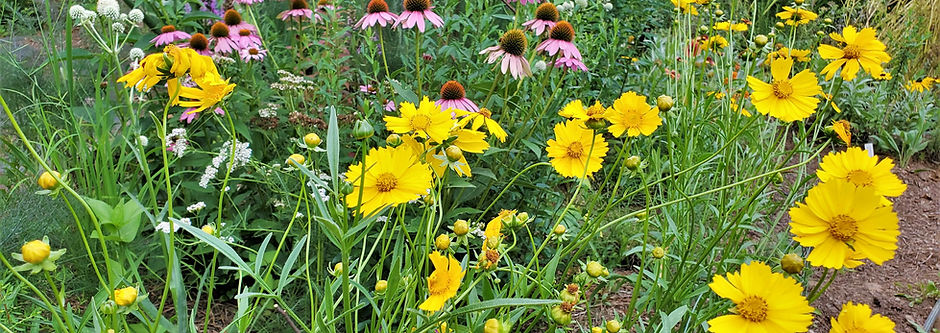Help Our Insects By Participating in the Great Georgia Pollinator Census 2021!
- ljmarkson

- Aug 17, 2021
- 3 min read
I want to encourage everyone to set aside 15 minutes this Friday, August 20 or Saturday, August 21 to participate in the Great Georgia Pollinator Census. This is a citizen science project coordinated by the University of Georgia Extension to encourage Georgians to learn more about insects and be open to planting a pollinator habitat with native plants. It is also designed to be straightforward enough so non-scientists can help researches by collecting data and documenting pollinator numbers in Georgia. In 2019 more than 4,600 counts were uploaded, documenting more than 131,000 insect visits tallied from 134 Georgia counties including 135 schools.

This would be a fantastic interactive activity to do with children of all ages to help them learn about pollinators. The site has a helpful Educator page with an adorable Backyard Nature Hunt printout. There are also links for teachers to lesson plans that align with Georgia Performance Standards. If you just can’t get enough of the count, you can even do it more than once during the two day period!

The site has a short video showing how to count participate in the census. Below are the basic steps outlined:
Download a pollinator counting sheet on Great Georgia Pollinator Census website which is also an insect identification guide for categorizing the pollinators that are seen.
Choose the most popular pollinator plant in a yard or local public garden or park. Find a native plant that has lots of insect activity on it.
Bring the pollinator count sheet, a pencil, and a chair, stool or blanket to watch the chosen pollinator plant.
Set a phone timer for 15 minutes.
Count how many insects land on any part of one plant and record it on the sheet. Count each time an insect lands on the plant, even if it is an insect that left and came back.
Go to the Great Georgia Pollinator Census website and record the findings. The form for this will be available on August 20 and stay up for a few weeks after the census.
There is a cute certification of completion that can be printed out – particularly for children.
The site makes the count super easy with a multitude of resources, including a social media logo and a helpful Insect Counting & Identification Guide with photos and identification tips,

If you want to post photos of your counters having fun, your garden or anything related that you think would be interesting you can post it in the Georgia Pollinator Census Facebook group.

If you live in an apartment or don’t have native plants in your yard, the website lists places in each county where you can participate. See the website for more details but places like Slow Pour Brewing, Blue Heron Nature Center, Tucker Butterfly Garden (August 21st 10-2 @4898 Lavista Rd, Tucker) are all on the list. If you live Intown Atlanta just some of the many gardens you can visit for free or a fee to view pollinators include: the Wylde Center greenspaces, Fernbank Science Center, Atlanta Beltline, Atlanta History Center, Woodland Gardens, the Carter Center pollinator garden, and local nature parks like Zonolite (where my friend Pat has created magnificent native plant patches).

If you live near Morningside, send me a message and I’d be happy to let you do the count on one of my clustered mountain mint plants (pycnanthemum muticum), which are practically vibrating with insect activity!

For those of us who feel somewhat helpless over what to do about the alarming insect decline and the lack of life in the traditionally landscaped yards all around us, this census has been shown to increase appreciation for insects, awareness about their habitat needs and create more interest in planting native plants to attract insects. So far 525 new pollinator gardens have been created as part of the project!

Pest control companies have made insects the enemies and we need to fight back against this characterization. By including all insects, not just butterflies and honey bees in the count, citizen science projects like the Great Georgia Pollinator Census create the kind of excitement and positive attitude towards insects that is needed to change the narrative about the value they offer our ecosystem.

Please share the highlighted link to the Great Georgia Pollinator Census in your social media networks to help save our precious insects! Check out their site for more detailed information, resources, and to download the counting sheet needed to participate.


.jpg)
